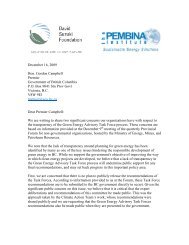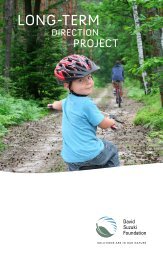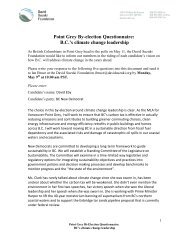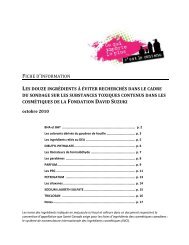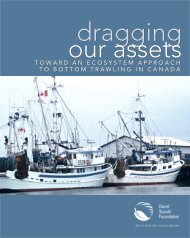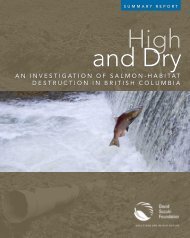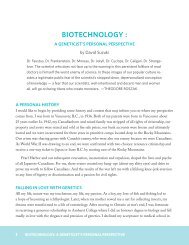Finding Solutions — Fall 2011 (PDF) - David Suzuki Foundation
Finding Solutions — Fall 2011 (PDF) - David Suzuki Foundation
Finding Solutions — Fall 2011 (PDF) - David Suzuki Foundation
Create successful ePaper yourself
Turn your PDF publications into a flip-book with our unique Google optimized e-Paper software.
iefs<br />
Environment minister acts on<br />
<strong>Foundation</strong>’s advice<br />
Recently, we learned that Maxim Power Corp. was rushing to<br />
build a coal-fired plant in Alberta that would emit far more<br />
greenhouse gas than impending federal rules would allow. We<br />
asked our supporters to write to Federal Environment Minister<br />
Peter Kent and demand that Maxim stop the rush job. A few<br />
weeks later, Kent announced that he’d heard Canadians loud and<br />
clear, and he would not tolerate companies rushing to complete<br />
dirty power projects.<br />
Montreal office has a new green home<br />
The Montreal branch of the<br />
<strong>Foundation</strong> recently moved<br />
into a new office building<br />
that is quickly becoming<br />
the heart of the city’s environmental<br />
movement. La<br />
maison du développement<br />
durable (Centre for Sustainable Development) boasts geothermal<br />
heating, a living plant wall, and an underground cistern that<br />
diverts rainwater to the building’s low-flow toilets. Like-minded<br />
neighbours in the building include Équiterre and Amnistie Internationale<br />
Canada Francophone.<br />
Megaquarry campaign<br />
prompts assessment<br />
Led by <strong>Foundation</strong> scientist John Werring, we recently joined<br />
over 130,000 Canadians in opposing a proposed limestone<br />
megaquarry near Melancthon, Ontario, which would leave a<br />
hole in the ground twice the size of Niagara <strong>Fall</strong>s. Thanks to<br />
pressure from local residents, politicians, First Nations, and<br />
nonprofit organizations, the Ontario government decided that<br />
this project should, at very least, be subject to a formal provincial<br />
environmental assessment. As the project transcends<br />
provincial boundaries, we are encouraging the federal government<br />
to get involved in the process.<br />
Feds reject funding for Pacific<br />
North Coast planning<br />
In our last issue of <strong>Finding</strong> <strong>Solutions</strong>,<br />
we profiled an ocean management<br />
and marine protected areas planning<br />
process for Canada’s Pacific North<br />
Coast. We and many participants<br />
were deeply disappointed to learn<br />
in September that the federal government<br />
pulled out of the funding<br />
photo: Lloyd K. Barners<br />
arrangement aimed at bringing scientific<br />
advice and community input to the process. Learn more<br />
and take action at: www.davidsuzuki.org/marine-planning.<br />
Former <strong>Foundation</strong> board member Ray Anderson<br />
photo: interfacefloreu<br />
Honouring two visionaries<br />
Like many environmental advocates, we at the <strong>Foundation</strong><br />
were saddened by the passing of two great leaders in the past<br />
few months.<br />
Jack Layton, who passed away in late August, needs little<br />
introduction. The leader of the NDP for eight years, Layton<br />
worked tirelessly toward his vision of an equal, just, and<br />
healthy nation. He was also very concerned with environmental<br />
issues. To quote <strong>David</strong> <strong>Suzuki</strong>: “Jack never forgot that<br />
justice and human rights were deeply embedded in issues<br />
of the environment. Today, too many of us act as if these are<br />
somehow separate, and so we are either environmentalists or<br />
workers for social justice. To Jack, they were a part of the same<br />
struggle for sustainable societies.”<br />
Also in August, we lost Ray Anderson, former <strong>Foundation</strong><br />
board member and the chair and founder of Interface, Inc.<br />
After coming to the life-changing realization that his business<br />
practices were harming the Earth, Anderson established a new<br />
mission for his company: achieving sustainability<strong>—</strong>operating<br />
in a way that does nothing to harm the Earth<strong>—</strong>by 2020. “Mission<br />
Zero,” as he called it, was a lofty goal for any company, let<br />
alone a flooring company reliant on the petroleum industry,<br />
but two years ago, he announced in an interview that Interface<br />
was already halfway there.<br />
Anderson’s ideas and drive influenced countless people,<br />
environmentalists, and businesspeople. He gave over a thousand<br />
speeches, wrote two books, and inspired many businesses<br />
to follow his lead, including GE and Walmart.<br />
Despite the traditional priorities of business and politics,<br />
Anderson and Layton never lost sight of what was fundamentally<br />
important<strong>—</strong>the health and well-being of humans and<br />
the environment. Both were ambitious, compassionate, and<br />
inspiring, and both succumbed to brave battles with cancer.<br />
They will be very much missed.<br />
Are you a teacher or youth educator?<br />
Sign up to learn about our youth-related activities and how we’re<br />
working with young Canadians to solve environmental challenges.<br />
www.davidsuzuki.org/young-canadians<br />
4



